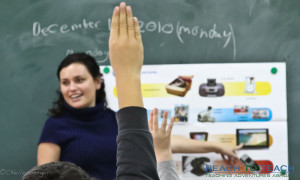The Art of Questioning

I’m sure we can all remember more than one class in high school or college in which we struggled to keep our heavy eyelids from shutting out an instructor droning on in an endless string of statements. Though the teacher or professor was doing their best to share the information in his/her head, very little of that information was entering ours.

There seems to be a misconception among many teachers that teaching is merely passing information. It is far more than that. It is taking responsibility for another’s learning, and learning is not like the storage of data in a computer.
Learning requires connections to form in our brains
Those connections depend on having familiar information to build upon. By responding to questions, our students are engaging these memories and connecting them to new ideas. The question then becomes How do we, as teachers, get our students to do this?
Socrates determined thousands of years ago that true understanding comes through questioning. Click To Tweet Through the Socratic method, a teacher continually asks questions to challenge a student’s assumptions or understanding until they encounter a contradiction. In this way, the student can learn exactly why his/her assumptions are incorrect. However, this method of teaching is useful in far more than determining logical inconsistencies.
We can use the Socratic model in any form of teaching. The process of learning is an exciting process that many children do not have the opportunity to experience because it has become a process of note-taking and memorization.
True understanding, though, comes not from memorization but from discovery. Through the process of confronting students’ current knowledge and working to expand it, they not only uncover ideas but they develop the ability to engage in this process on their own.
Effective Teaching
Let me give an example. I have a young student (upper elementary school), who is still struggling to read. He has a moderately large vocabulary and uses it very confidently. In fact, one of the challenges of this class is getting him to quiet down.
However, when I ask him to read words on a page, he struggles and often guesses at words he doesn’t know. I believe that this is a result of his previous teachers’ tendency to immediately pronounce the word for him. Instead of actually learning to sound out a word (not always a simple procedure in English), he would parrot back the word the teacher said.
I am not so generous.
I walk him through each letter and letter combination asking What sound does this make? Almost always, he answers correctly, and it’s only a few seconds before he gathers enough clues in the word to identify it and pronounce it correctly.
Though the process is slow, he is starting to do this on his own more often, developing not only literacy but self-reliance, a skill that goes far beyond any academic setting.
Natural Learning
All that we, as a species, have learned about our world, we have uncovered using the base of knowledge discovered previously. For individuals, it need not be any different. Of course, there are contrived conventions that need to be taught, but these too can be taught by discovery and questioning.
If I point to the letter B on the board while making the sound “buh, buh, buh,” and then ask a student, “What sound does this make?” I am fairly certain that they will catch on.
In that process, they are not just parroting what I told them. I have not told them anything. They are making an inference using their own intellectual abilities to answer a question about their observations.
Human beings are naturally curious
Many of us have had that curiosity beaten out of us by years of rote memorization and acceptance of stated facts, but education does not need to be this way. Indeed, it should be quite the opposite. Even in learning language, students can make discoveries on their own, make inferences from text, or arrive at conclusions based on their observations of us.
The Socratic method of questioning is not a panacea, but it is an integral part of the teaching process. Often we will simply not have time to walk students through every logical construction, but to spend an entire lecture telling the students what to learn instead of asking them to figure it out is a waste of our time and theirs.
Take the classroom with the droning lecturer and replace him/her with a constantly questioning teacher, who demands every student to make inferences and deductions based on previously established material. Do you think you would fall asleep in that class? Do you think you would actually learn something?
What thoughts do you have on this method of teaching? Is this a method you like to use in your teaching style? Let us know your thoughts in the comments section below.



